Hillary Clinton outlines plan to limit gun violence after Oregon massacre
- Share via
By the numbers
Welcome to Trail Guide, your daily host through the wilds of the 2016 presidential campaign. It's Monday, Oct. 5, and this is what we're watching:
- Hillary Rodham Clinton is back in New Hampshire to propose restrictions on guns
- Clinton also previewed how she'll testify before the Benghazi committee next week
- Did you catch her appearance on "Saturday Night Live"?
- He may not have been much of a factor during the summer, but Marco Rubio is gaining momentum
New Clinton ad seizes on McCarthy's Benghazi comments
Hillary Rodham Clinton isn't likely to stop talking about Republican Rep. Kevin McCarthy's Benghazi comments anytime soon. In fact, she may just be getting started.
To nobody's surprise, the Clinton campaign now has an ad out. It accuses McCarthy, the leading candidate to succeed John A. Boehner as House speaker, of admitting that the GOP committee set up to investigate the Benghazi attacks is merely a "partisan attack vehicle."
The star of the ad is, of course, McCarthy. It features the Fox News interview where he boasted that Clinton's plunge in the polls was thanks to the committee's work.
Her "numbers are dropping," he said, because "she's untrustable."
The 30-second spot, paid for by Hillary for America, claims the true goal of the House Select Committee on Benghazi is to damage Clinton's political standing -- not to investigate the tragic events that happened there.
The Clinton campaign is eager to discredit the committee in the lead-up to her scheduled testimony before it on Oct. 22.
"The Republicans finally admit it," a voice says in the ad, which the campaign released Monday. "The Republicans have spent millions attacking Hillary because she's fighting for everything they oppose."
Sanders and Trump rail against Trans-Pacific Partnership
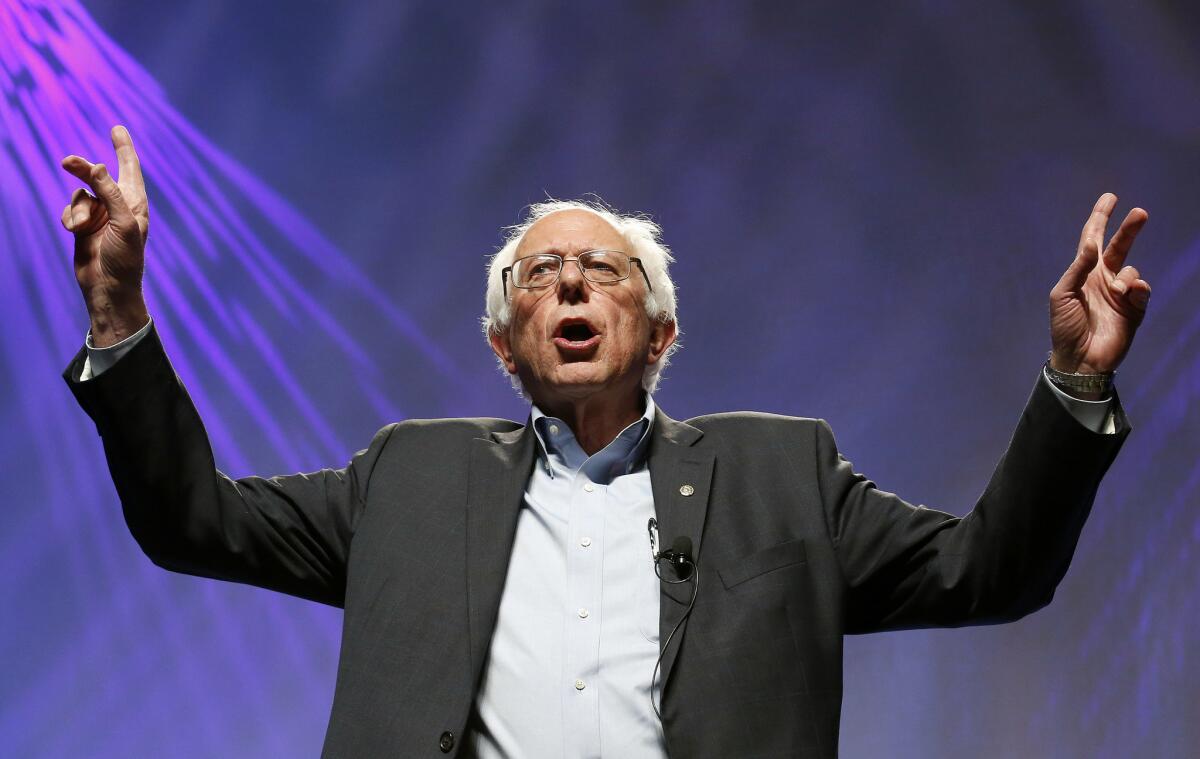
Democratic presidential candidate Sen. Bernie Sanders of Vermont speaks at the Netroots Nation political conference in Phoenix on Saturday.
On the campaign trail, opponents of the proposed Trans-Pacific Partnership trade agreement were considerably more vocal than supporters Monday.
Sen. Bernie Sanders of Vermont was one of the first out the gate, calling it a "disastrous" move that will hurt consumers and cost American jobs.
On Twitter, Sanders said he was "disappointed but not surprised" by the decisions to move forward on the deal that will phase out tariffs on thousands of goods and establish uniform rules of commerce.
"Wall Street and other big corporations have won again," he tweeted, vowing to "do all that I can to defeat this agreement" in Congress.
It's unclear whether President Obama has enough votes to win support for his trade agenda in Congress. Obama's biggest roadblock is coming from lawmakers in his own party, who have traditionally been suspicious of trade agreements.
Although Republicans are generally supportive of free trade, some GOP lawmakers are reluctant to hand Obama a victory, particularly during the 2016 presidential election.
Sen. Marco Rubio (R-Fla.) was noncommittal in his response to the partnership on Monday, saying he would need to see the details of the agreement before deciding how he will vote.
"I'm generally very much in favor of free trade," he told CNBC's John Harwood. "The United States cannot get locked out of 95% of the world's consumers."
Generally, Rubio added, the pact is "very positive."
In a message on Twitter Monday afternoon, Republican presidential hopeful Donald Trump called the trade agreement a "terrible deal."
"The incompetence of our current administration is beyond comprehension," he wrote.
Ted Cruz says taking in Syrian Muslim refugees is 'nothing short of crazy'
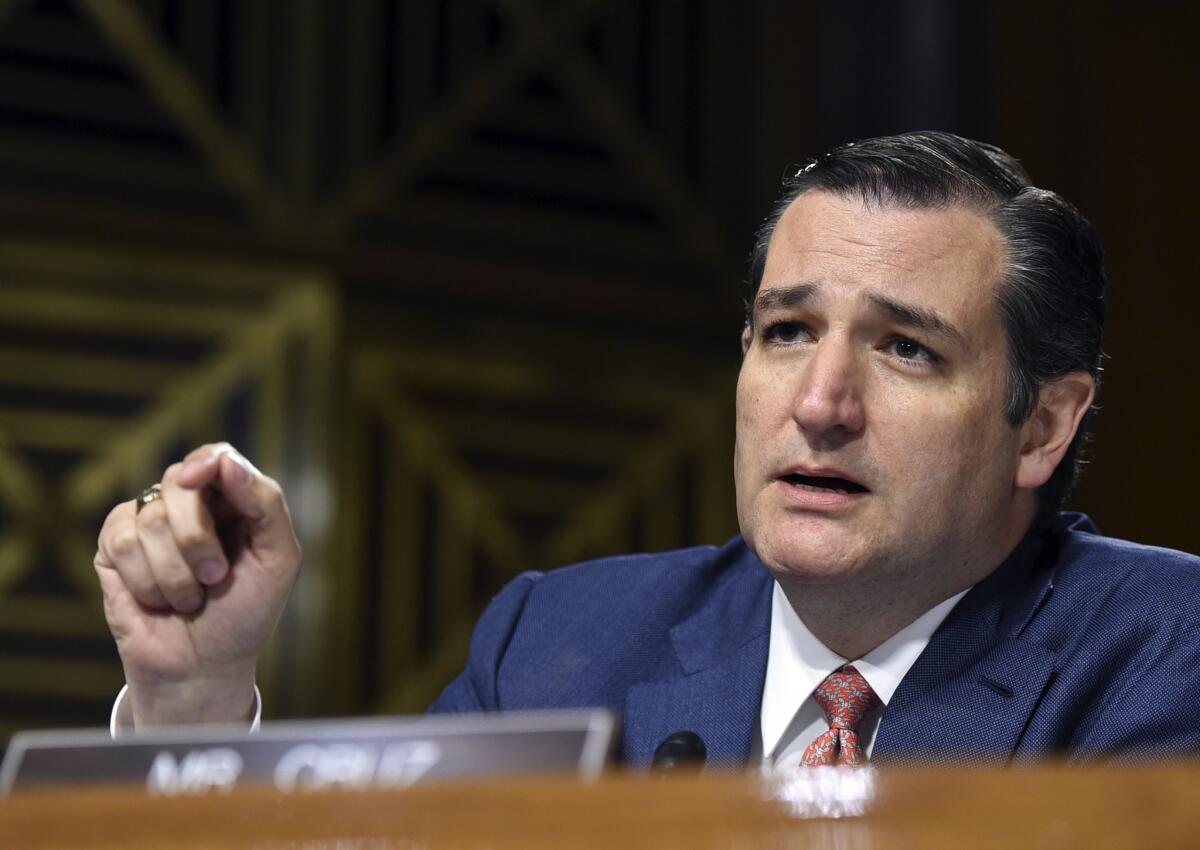
Republican Sen. Ted Cruz of Texas is targeting the Supreme Court for a series of recent rulings that he says shows the need for the justices to be elected, not appointed.
Republican presidential candidate Sen. Ted Cruz spoke out Monday against President Obama's plan to accept Syrian refugees, calling it "nothing short of crazy."
"It would be the height of foolishness to bring in tens of thousands of people including jihadists that are coming here to murder innocent Americans," Cruz (R-Texas), said at a campaign stop in Michigan, according to the Associated Press.
Cruz, the son of a Cuban refugee, previously said he would accept Christian refugees into the U.S. because they are being persecuted for their faith.
"I think the Christians are a very different circumstance because Christians are being persecuted, they are being persecuted directly for their faith and the Obama administration has abandoned Middle East Christians," Cruz said in a September interview with Iowa Public Television.
Obama has pledged to take in at least 10,000 refugees fleeing war-torn Syria during this fiscal year. Last week, he ordered the ceiling for the number of total refugees allowed into the U.S. from all countries raised from 70,000 to 85,000.
"What President Obama is proposing to do, bring tens of thousands of Syrian Muslims to America, is nothing short of crazy," Cruz said Monday, campaigning ahead of Michigan's March 8 presidential primary.
Speaking to a crowd of about 800 people, Cruz acknowledged the humanitarian crisis but said refugees "ought to be settled in the Middle East, in majority Muslim countries."
Cruz cited recent comments by Director of National Intelligence James Clapper, who has expressed concern over the chance that a terrorist could try to enter the country disguised as a refugee.
"We don't obviously put it past the likes of ISIL to infiltrate operatives among these refugees," Clapper said last month, adding that the United States has a rigorous vetting process.
Clinton: 'How many people have to die?'
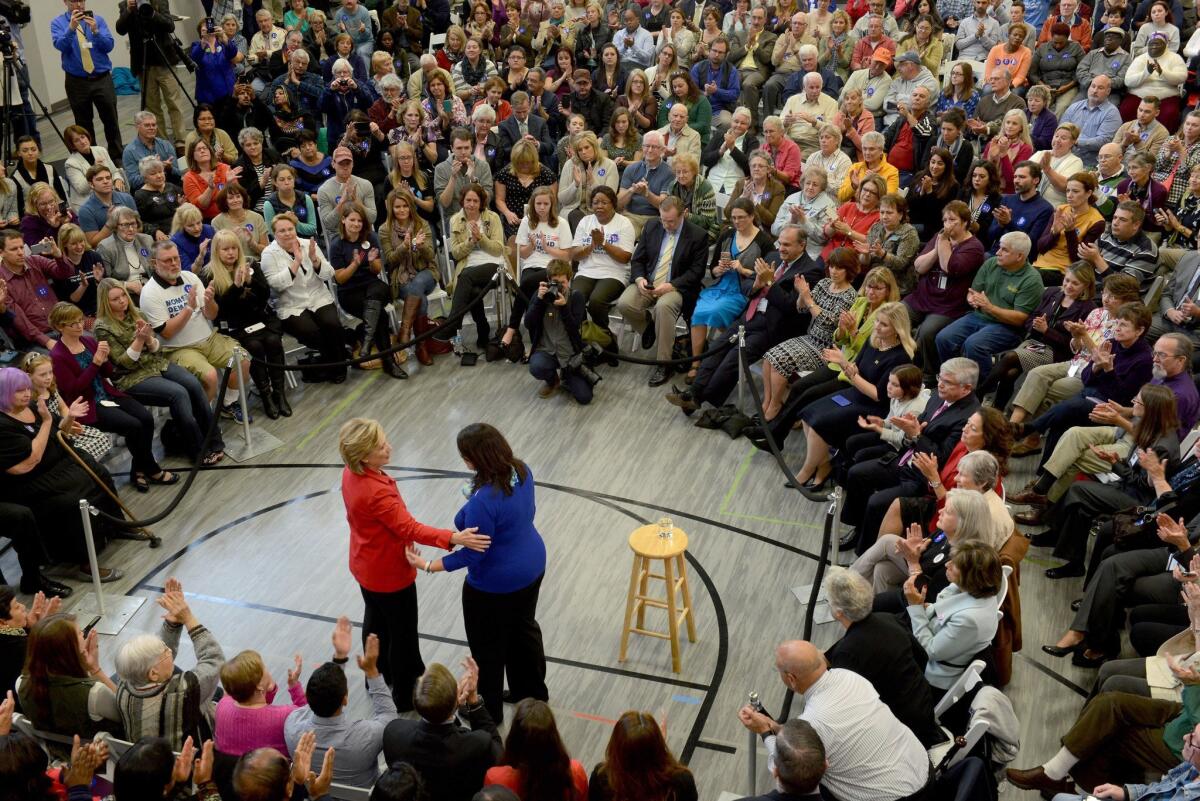
Hillary Rodham Clinton reaches out to Nicole Hockley, whose child was killed at Sandy Hook Elementary School, during a town hall event at Manchester Community College Oct. 5, 2015 in Manchester, New Hampshire.
As Hillary Rodham Clinton announced gun safety initiatives at a New Hampshire town hall meeting Monday, a reminder of the political peril involved in the debate was literally front and center.
At one point Clinton handed the microphone to a former New Hampshire congressman who lost his seat in 1994 after supporting the last successful major congressional overhaul of gun laws, which included a ban on assault weapons.
The congressman, Dick Swett, mentioned his vote but not the political price he paid. But he read a letter he'd personally received from former President Ronald Reagan calling the provisions of the bill "absolutely necessary."
"I have every confidence that as our president, Hillary, you will be able to tackle this problem," Swett said.
Clinton's willingness to put the gun issue at the forefront of her campaign represents a calculated risk that the politics have indeed changed on the issue. But it also presents the former secretary of State a chance to counter the summer-long surge by Vermont Sen. Bernie Sanders, whose record on guns -- including a vote against the 1993 Brady Bill that created the background check system -- has already been attacked by other Democratic hopefuls.
Among the steps Clinton proposed Monday was repealing a 2005 law that protects gun dealers or manufacturers from being held liable for damages when weapons they make or sell are used in criminal acts. Clinton had voted against the law when she served in the Senate, but Sanders supported it while serving in the House.
Clinton echoed President Obama's recent comments after a gunman shot nine people to death at a community college in Oregon, saying that simply expressing thoughts and prayers after such mass shootings "is not enough."
------------
FOR THE RECORD
Oct. 5, 2:29 p.m.: An earlier version of this article said a gunman shot eight people to death at a community college in Oregon. The gunman fatally shot nine people.
------------
"This epidemic of gun violence knows no boundaries, knows no limits of any kind," she said. "How many people have to die before we actually act?"
Clinton also invited another advocate to join her on stage: Nicole Hockley, mother of one of the victims of the Sandy Hook Elementary massacre in 2012. Clinton's voice choked with emotion as she noted how Hockley and others "have taken the unimaginable grief that they have been bearing and have tried to be the voices that we need to hear."
Referring to her new proposals, Clinton did something rare for a candidate -- downplaying them as hardly new to the debate.
"There's nothing unique about them other than the fact that I'm so determined we're going to do everything we possibly can to get this done," she said.
Next up for Hillary Clinton: a push for gun restrictions
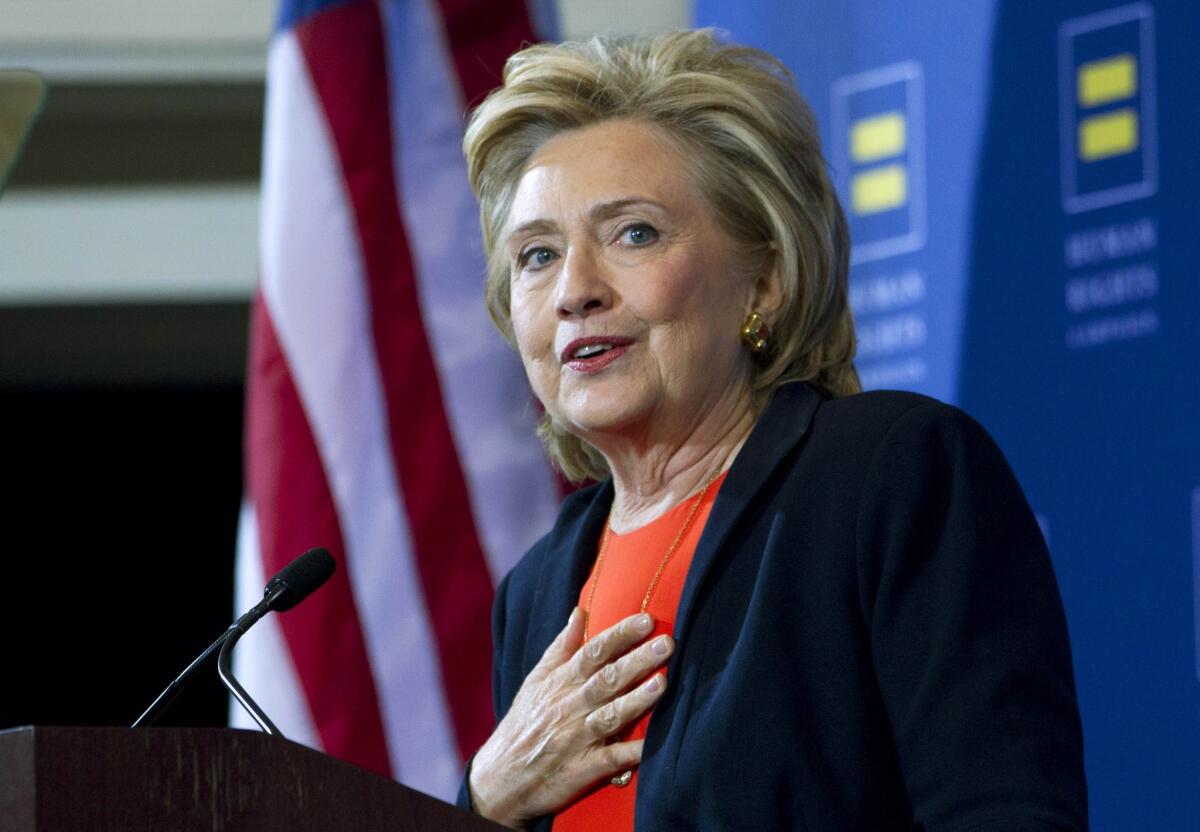
FILE - In this Oct. 3, 2015 file photo, Democratic presidential candidate Hillary Rodham Clinton gestures as she speaks at Human Rights Campaign gathering in Washington. Just days after a deadly shooting in Oregon, Clinton will unveil new gun control measures on Monday, Oct. 5, aimed at strengthening background checks on gun buyers and eliminating legal immunity for sellers. (AP Photo/Jose Luis Magana, File)
In the wake of last week's mass shooting in Oregon, Hillary Rodham Clinton is offering a proposal aimed at limiting gun violence. Her policy prescription has a political advantage, too: Her rival for the Democratic nomination, independent Sen. Bernie Sanders of Vermont, has a record of voting against legislation limiting gun rights.
Clinton's proposal didn't name Sanders but her discussion of gun laws can help her illuminate a key difference between the two candidates.
The Times' Michael A. Memoli has more on what Clinton is proposing today in New Hampshire:
Hillary Clinton goes after Republicans over Benghazi committee
Hillary Rodham Clinton blasted Republicans Monday for "making a partisan, political issue out of the deaths of four Americans" in the 2012 Benghazi attacks, seizing on a top lawmaker's recent comments about the congressional committee investigating the assault that have added a new political dimension to Clinton's scheduled testimony before the panel next week.
During an appearance on NBC's "Today" show, Clinton referred four times in five minutes to what she called the "admission" that the committee was created primarily to hurt her presidential campaign, saying it was "beyond the pale." She did not mention by name the lawmaker, House Majority Leader Kevin McCarthy of Bakersfield, who said last week that Clinton was no longer "unbeatable" because of the committee's work.
The special committee was impaneled to investigate the attacks in Benghazi, Libya, that killed Ambassador J. Christopher Stevens and three other Americans, as well as the response of Clinton's State Department.
"Look at the situation they chose to exploit to go after me for political reasons: the death of four Americans in Benghazi," Clinton said, her voice rising with anger as she noted that she had personally asked Stevens to become ambassador.
"There have been seven investigations, led mostly by Republicans in the Congress, and they were nonpartisan and they reached conclusions, first of all, that I and nobody did anything wrong, but there were changes we could make," she said.
Clinton's comments were the clearest sign yet of how the politics surrounding the Benghazi probe and her use of a private email server -- the panel's most visible public finding -- have shifted because of McCarthy's comments.
"Everybody thought Hillary Clinton was unbeatable, right?" McCarthy said during a Fox News Channel interview. "But we put together a Benghazi special committee. A select committee. What are her numbers today?"
Clinton's response Monday signaled how she is preparing to use McCarthy's comments to discredit the panel ahead of her testimony, set for Oct. 22.
"If they're going to have it still running, I'll be there," she said. "And I'm looking forward to answering questions about real things when I'm there, and I'm looking forward to having a chance to explain everything."
She did not go so far as to call for disbanding the panel, saying that step is up to Congress "now that they've admitted it's a political, partisan committee for the sole purpose of going after me, not trying to make our diplomats who serve in dangerous areas safer."
Clinton's ability to turn the comments into a political cudgel against the GOP has also contributed to a threat to what seemed to be McCarthy's inevitable rise to House speaker, replacing John A. Boehner, who's retiring at the end of the month. Rep. Jason Chaffetz of Utah announced Sunday that he would challenge McCarthy for the position, days after he called on McCarthy to apologize for the remarks.
Marco Rubio gains momentum -- can he capitalize on the moment?
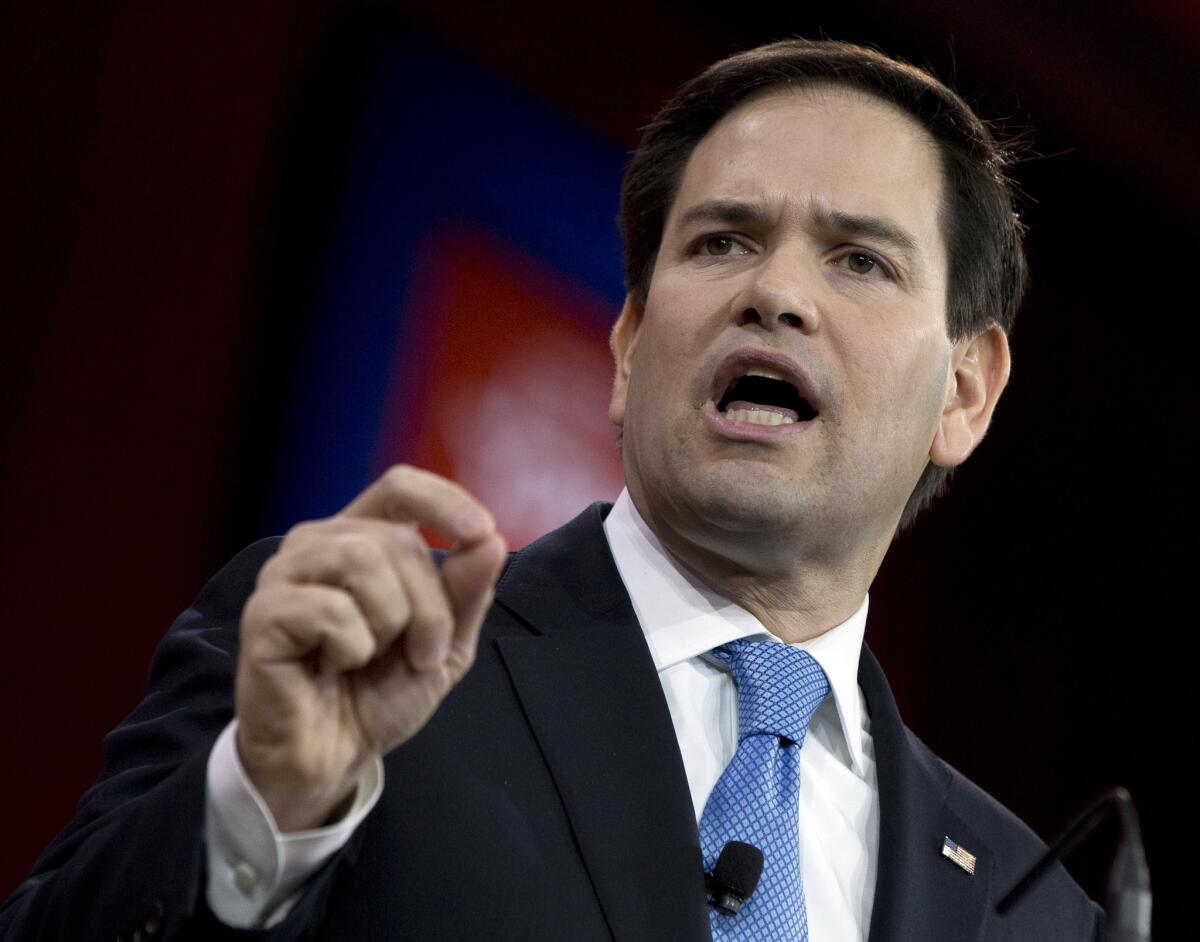
After a summer in which he was not much of a factor in the presidential campaign, Marco Rubio is rising in the polls, though he still lags far behind Republican front-runner Donald Trump. In some surveys, he has surpassed former Florida Gov. Jeb Bush.
The momentum is driven by Rubio's strong debate performances along with developments outside his control -- two of his rivals dropping out and Bush, widely expected to lead the field, running what so far has been an inconsistent effort. Bush's campaign had to spend part of last week reassuring jittery donors.
Rubio has stepped up his appearances and his organizational efforts around Iowa, which in February will hold the first nominating contest in the nation. The question is whether he can capitalize on the moment, turning intrigued voters into committed supporters.
By the numbers
Sign up for Essential California
The most important California stories and recommendations in your inbox every morning.
You may occasionally receive promotional content from the Los Angeles Times.






